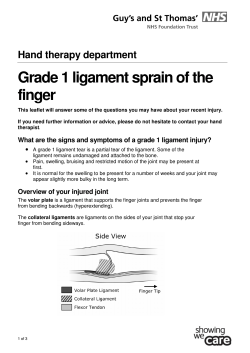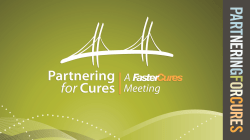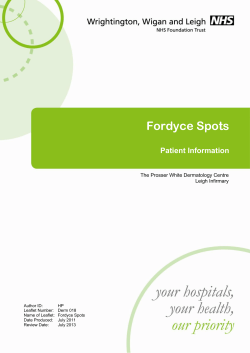
Immunotherapy treatment for your allergy
Immunotherapy treatment for your allergy This leaflet aims to answer your questions about having immunotherapy. It explains the benefits, risks and alternatives, as well as what you can expect when you come to hospital. If you have any further questions, please speak to a doctor or nurse caring for you. What is immunotherapy? Immunotherapy, also called desensitization, is a treatment for allergies. The cause of your allergy, such as pollen, cats or bee stings, is known as an allergen. Immunotherapy involves injecting small amounts of this allergen under your skin (subcutaneously). The amount of allergen injected is gradually increased, which reduces your sensitivity to it. You may have been recommended this treatment: if you have severe allergies, such as to bee or wasp stings, hay fever or year-long allergies if your medication does not control your symptoms very well, or to reduce your reliance on medication. Bee and wasp immunotherapy is effectively a cure for bad reactions to stings; however, a very few people may be re-sensitised (become allergic) again in the future. Immunotherapy does not cure allergy to pollens, animals or dust mites, but can provide relief from your symptoms and reduce your need for extra medicine to keep it under control. Before your treatment We will ask you to sign a consent form, which confirms that you agree to have the treatment and understand what it involves. You should receive the leaflet, Helping you decide: our consent policy, which gives you more information. If you have not received one, please ask us for a copy. You may have to stop taking certain medications temporarily while having immunotherapy, such as beta blockers or certain antidepressants. Your doctor will discuss this with you before you start your treatment. You will not have to stop taking any existing allergy or asthma treatment. 1 of 4 What happens during treatment? Your treatment will depend on the type of allergy you have: Allergy to pollens (hay fever). This involves weekly visits for a number of weeks before the pollen season starts. The number of visits ranges from 4 to 10 depending on which pollens you are allergic to and the vaccine used. For maximum effect the treatment must be given each year for three consecutive years. You should notice a reduction in your symptoms after the first year but the greatest effect is after 3 years. The effects of the treatment can last seven years or more. Allergies to perennial (year-long) allergens or insect stings (bee or wasp stings, cats, dogs, or house dust mites). Treatment is given in two phases: initial (up dosing) treatment and then maintenance. Initial treatment involves weekly visits for 6 to 12 weeks depending on the vaccine required. Maintenance treatment involves returning for injections every 6 or 8 weeks for three years. Your symptoms should improve from the end of the initial phase, but maintenance treatment is needed to reduce your symptoms in the long term (decades). Your doctor will explain further about maintenance treatments. If you decide to have immunotherapy you must commit yourself to the full course of treatment. If you miss more than 2 weeks of weekly injections, the dose may be reduced, increasing the length of your treatment. You may even have to start your treatment again from the beginning. Are there any alternatives? Your doctor or nurse will explain any alternative treatments to you. The options available to you will depend on the type of allergy you have. Are there any side effects? Side effects can be local, general or severe: Local reactions include swelling, redness and itching at the site of your injection. This may occur on the day of your treatment or for up to a day afterwards. General symptoms include asthma, rhinitis (inflammation of the lining of the nose) or urticaria (nettle rash hives) anywhere on the body. If these side effects occur, they will typically do so within 10 minutes of the injection, but are often short-lived. You may need to take anti-histamine or steroid tablets for a few days afterwards. Severe anaphylaxis (severe allergic response) can occur but is extremely rare with modern vaccines. Symptoms may include all over rash, severe tightness in the throat or lungs, low blood pressure or unconsciousness. Other side effects include: Feeling tired – some people complain of tiredness which may last for varying periods of time. Asthma – immunotherapy can occasionally make asthma worse, which is why we do not recommend it for patients with severe asthma. If you have severe asthma, treatment may have to be deferred until it is better controlled, or sometimes abandoned. If you have asthma and it gets particularly bad during your treatment, you should tell the nurse or doctor. Page 2 of 4 If side effects occur, they will almost always appear within an hour of your treatment and usually within minutes. For this reason, you must stay in the clinic for one hour after your injection, so that we can observe you and keep you safe. If you start to feel unwell after your injection, please remain seated and notify a member of staff. We can then give you the appropriate treatment. We recommended that you do not do any vigorous exercise immediately before or for twelve hours after your treatment, as this can sometimes cause the allergen to be released from the injection site and make side effects more likely. This is particularly relevant if you have asthma. The immunotherapy clinics The clinic for house dust mites or pollens is held from 9am to 1pm and 2pm to 5pm on Mondays in the general outpatients department, on the second floor of Thomas Guy House, Guy’s Hospital. We stop giving injections at 12 noon and 4pm, because you must wait in the clinic for an hour after your injection. If you arrive after these times, we will have to reschedule your appointment. For safety reasons we ask that you do not arrive more than 10 minutes before your appointment as seating is limited. The clinic for wasp and bee stings is on Tuesdays from 9.20am to 11.50am. Last injection is at 10.50am. Routine treatment visits involve: questions about your general health peak flow measurement (measurement of your lung capacity) for safety reasons, particularly if you have asthma your immunotherapy injection observation in clinic for one hour a check-up and repeat peak flow measurement after one hour and before leaving the clinic arranging a follow-up appointment for your next visit. Appointments at King's We have teamed up with King’s College Hospital in a partnership known as King’s Health Partners Academic Health Sciences Centre. We are working together to give our patients the best possible care, so you might find we invite you for appointments at King’s. To make sure everyone you meet always has the most up-to-date information about your health, we may share information about you between the hospitals. Contact us If you have any questions or concerns about the treatment, have a cold, fever or worsening allergy or asthma symptoms, please contact the allergy nurse specialist on 020 7188 5830 (Monday to Friday, 9am to 5pm). Out of hours, please contact your GP or go to your nearest Accident and Emergency (A&E) department. If you need to change your appointment, please call the allergy clinic on 020 7188 5843 or email SCIT@gstt.nhs.uk. Page 3 of 4 Pharmacy medicines helpline For information about any medicines that you have been prescribed at Guy's and St Thomas' hospitals, you can speak to the staff caring for you or call our helpline. t: 020 7188 8748 9am to 5pm, Monday to Friday Patient Advice and Liaison Service (PALS) To make comments or raise concerns about the Trust’s services, please contact PALS. Ask a member of staff to direct you to the PALS office or: e: 020 7188 8801 at St Thomas’ t: 020 7188 8803 at Guy’s e: pals@gstt.nhs.uk Knowledge & Information Centre (KIC) For more information about health conditions, support groups and local services, or to search the internet and send emails, please visit the KIC on the Ground Floor, North Wing, St Thomas’ Hospital. t: 020 7188 3416 Language support services If you need an interpreter or information about your care in a different language or format, please get in touch using the following contact details. t: 020 7188 8815 fax: 020 7188 5953 NHS Direct Offers health information and advice from specially trained nurses over the phone 24 hours a day. t: 0845 4647 w: www.nhsdirect.nhs.uk NHS Choices Provides online information and guidance on all aspects of health and healthcare, to help you make choices about your health. w: www.nhs.uk Become a member of your local hospitals, and help shape our future Membership is free and it is completely up to you how much you get involved. To become a member of our Foundation Trust, you need to be 18 years of age or over, live in Lambeth, Southwark, Lewisham, Wandsworth or Westminster or have been a patient at either hospital in the last five years. To join: t: 0848 143 4017 e: members@gstt.nhs.uk w: www.guysandstthomas.nhs.uk Leaflet number: 1646/VER3 Page 4 of 4 Date published: September 2012 Review date: September 2014 © 2012 Guy’s and St Thomas’ NHS Foundation Trust
© Copyright 2025





















